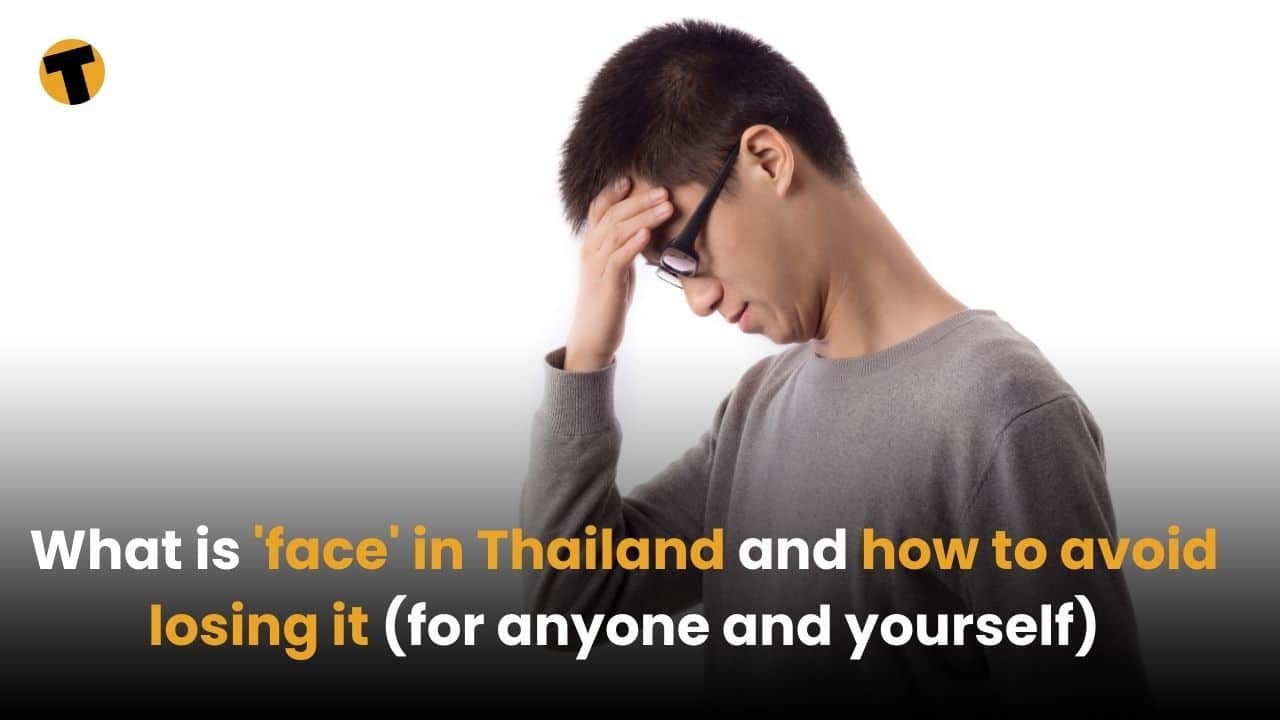What is ‘face’ in Thailand and how to avoid losing it (for anyone and yourself)
A quick look at how dignity, tone, and communication shape daily interactions in Thailand

If you are new to life in Thailand, there is one cultural idea that will help you settle in far more smoothly than memorising phrases or learning the bus routes. It is the concept of face and it has nothing to do with your appearance. It is about dignity, respect, and how people are perceived by those around them.
Once you start living here, you will notice how much value Thais place on harmony and avoiding embarrassment. Understanding how face works will spare you a lot of confusion, awkward moments, and misunderstandings. It can also help you build genuine, lasting relationships with the people you meet.
To avoid generalisation, just like anywhere in the world, you will come across all sorts of people with varying patience and it depends on how close you are with someone. As far as I have experienced, it is pretty hard to make people in Thailand angry but a high threshold leads to high breakdowns.
So what exactly is face?

In Thailand, face refers to a person’s public image. It encompasses the level of respect they receive, the manner in which they are spoken to, and their place within social circles. Losing face means being embarrassed or criticised. Gaining face means being respected, acknowledged, or treated kindly.
People from more direct cultures often struggle with this at first. Back home, being straightforward might be seen as honest or efficient. In Thailand, the style is different, as people tend to avoid confrontation, and conversations often take a softer, more considerate approach.
One thing to keep in mind is that this idea exists in other Asian countries too (and even other countries in the world. In Thailand, it is particularly well-known and partially infamous for this, as it shows up everywhere, in offices, in schools, in shops, and even in casual social interactions.
It would be incorrect to say that Thai people are obsessed with the concept of saving face; however, one thing to keep in mind is that it is ingrained pretty deeply in the society.
Common ways people lose face in Thailand
Foreigners may often cause others to lose face without realising it, simply because they are doing something that feels normal in their own culture.
Here are a few situations to watch out for:
- Publicly correcting someone: Even if you are trying to help, pointing out a mistake in front of others can embarrass someone. Thais typically prefer issues to be addressed quietly and privately.
- Showing anger or impatience: Raising your voice, complaining loudly, or creating a scene makes everyone uncomfortable. Keeping calm is highly respected here, especially when things are stressful.
- Teasing that goes too far: Humour does not always travel well. Jokes about appearance, age, work performance, or family can easily be taken the wrong way. Keep in mind that between friends or people you know, it will not be that bad and teasing is fair game.
- Criticising institutions or processes: Complaining openly about schools, offices, or public systems can backfire. If you have a concern, it is usually better to use official channels or speak to someone privately.
Being aware of these moments helps you avoid unintentional offence.

How to protect your face and build stronger relationships
The concept of face is not only about avoiding problems. It is also about offering people respect and helping them keep their dignity, even when the situation is awkward. Small gestures make a big difference.
Here are some approaches that work well in Thailand:
- Stay calm when things go wrong: Whether it is slow service or a misunderstanding, patience earns you quiet respect. Losing your temper has the opposite effect. You will find that Thai people are surprisingly patient; however, there are severe consequences to crossing that high threshold.
- Use softer language when disagreeing: Instead of “No, that is wrong,” try “Maybe we can try another way” or “What if we look at this option.” You still express your point without putting anyone on the spot.
- Praise in public, discuss problems in private: Public appreciation boosts someone’s confidence. If something needs correcting, speak to the person one-on-one.
- Be mindful of jokes: If you are unsure whether something could be misinterpreted, skip the joke. Politeness goes a long way here.
These behaviours help you form better connections and show that you understand the cultural tone of communication.
What happens when face is lost?

Causing someone to lose face in Thailand can create tension, even if no one says anything directly. Someone who feels embarrassed might pull away, avoid future interactions, or become hesitant about working with you. Thai people rarely confront problems head-on, so the impact might show up quietly instead of immediately.
On the other hand, when you help someone save face, it builds trust. Many long-term expats say that understanding this one cultural principle made daily life much easier, whether dealing with neighbours, colleagues, shop staff, or government offices.
Understanding face in Thailand is not about being overly cautious or pretending to agree with everything. It is simply about recognising that dignity matters in Thailand and that people appreciate conversations handled with care.
If you help others maintain their sense of respect, you will protect your own and build more meaningful relationships in the process. Whether you are here for a year or for the long haul, this small cultural insight will make a big difference in how smoothly your life in Thailand unfolds.
The Thaiger key summary
- Social interactions in Thailand often favour harmony over confrontation.
- Public embarrassment can create quite a distance rather than open conflict.
- Soft communication and indirect phrasing are common features of daily life.
Latest Thailand News
Follow The Thaiger on Google News:


























